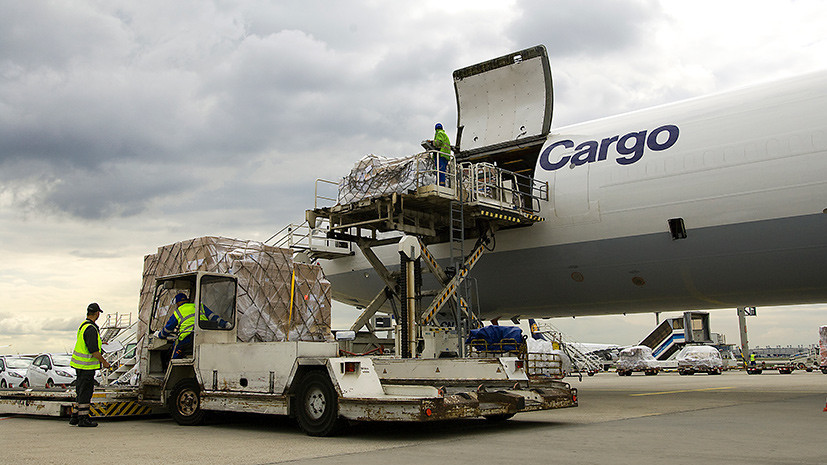In August 2019, global demand for the delivery of goods by air decreased by 3.9% compared to the same period in 2018. This is stated in the October report of the International Air Transport Association (IATA). As noted in the organization, the indicator has been continuously decreasing since November 2018. Thus, the market decline was the longest over the past 11 years.
“Demand reduction has not been observed for ten consecutive months since the 2008 global financial crisis. This causes us serious concern. Without any visible signals of declining tensions in global trade, we expect the business environment in the air cargo industry to continue to deteriorate, ”said IATA Director General Alexander de Juniac.
Pressure on the market has a general slowdown in the global economy, trade wars and Brexit. This was told in an interview with RT by the head of the airline department of the AsstrA group of companies Anton Nowov.
“Demand for air travel mirrors the state of the global economy. According to IATA, global GDP growth has fallen by 0.4 percentage points compared to last year. The main impact on the decline had a US trade war with China and Brexit. So, most cargo today flies in the directions Asia - North America (with a share of 23.6%) and Asia - Europe (21.4%), ”Nowov said.
According to Alexander Bakhtin, investment strategist at BCS Premier, in an interview with RT, the US-China trade war provoked a slowdown in the two largest economies in the world. As a result, the volume of trade between states began to decline. From January to September 2019, the US-Chinese trade turnover decreased by almost 15% to $ 402 billion. Such data are provided by the PRC Main Customs Board.
Recall that the trade war between the United States and China began in 2018. The States accused China of illegally acquiring American technology and increased duties on Chinese goods imported into the country. Beijing has introduced a response. After a series of negotiations in May 2019, Washington went on to aggravate the conflict: in addition to introducing new duties, American technology companies began to stop cooperation with Huawei. In August, the countries again failed to find a compromise on the terms of the trade deal and in September introduced new mutual restrictions.
Following the results of regular negotiations in October, China and the United States were still able to partially agree on the terms of the trade deal. Meanwhile, global investors are still afraid of a new exacerbation.
“The trade war has already led to a decrease in the economic activity of enterprises not only in the USA and China, but also throughout the world. The threat of intensification of the conflict and its spread to other countries that are partners of the PRC has created lull and uncertainty in the global market, ”said Artyom Deev, head of the AMarkets analytical department, in an interview with RT.
As previously stated by the managing director of the International Monetary Fund (IMF) Kristalina Georgieva, tariff wars have virtually stopped the growth of world trade. As a result, by 2020, the global economy may be missing $ 700 billion.
In its latest report, the World Trade Organization (WTO) downgraded its forecast for world trade growth in 2019 from 2.6% to 1.2%. According to Alexander Bakhtin, the growth rate will be the lowest in ten years.
Moreover, in the III quarter of 2019, the WTO index of international air cargo transportation fell for the first time since 2011 to the level of 91.4 points. Note that the drop below 100 points indicates the industry lags behind medium-term trends.
In addition to trade wars, high oil prices also influenced the market. As noted by Alexander Bakhtin, the increased cost of raw materials led to a rise in the cost of jet fuel and made the transportation of goods by air less profitable.
“With a general slowdown in freight demand, the average price of Brent crude oil remained quite stable - in 2018, its cost was $ 69.8 per barrel, and in 2019 it is forecasted to be $ 65. Stable preservation of oil prices at a relatively high level reduces the profitability of air transportation of goods, ”the analyst explained.
According to Bakhtin, further market dynamics will largely depend on economic growth in developed and developing countries, as well as on the pace of recovery in world trade. At the same time, Anton Nowov expects that the air cargo sector may resume growth in the near future.
“First, the US and China will someday still be able to agree on a deal. Secondly, now the demand for the e-commerce segment and express delivery is growing. New high-tech goods appear with a short “life cycle” and goods with a strict logistics requirement (temperature and perishable goods, expensive spare parts). All these factors will ensure the restoration of the cargo aviation market in the near future, ”the expert concluded.

